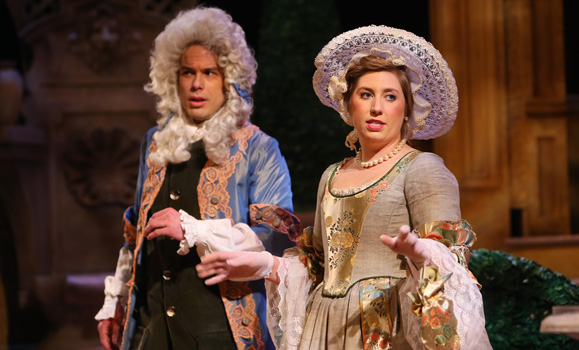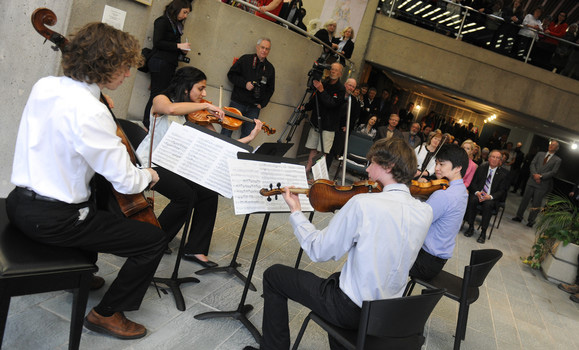The Dalhousie Arts Centre hosts concerts, plays, comedy performances and countless other cultural events. But patrons who only know it as “The Cohn,” the name of its largest theatre, might not necessarily be aware of the work of the two academic departments whose students and faculty call the Arts Centre home.
That desire for a greater community profile is part of the inspiration behind the creation of the Dalhousie School of Performing Arts, which will bring the Departments of Music and Theatre together under one banner.
But it’s also about a much larger vision, according to the Dean of the Faculty of Arts and Social Sciences (FASS): to create a national and international calibre centre for the performing arts and performing arts education in Halifax.
“If you were to ask me where we want to be in 10 years, I’d say our vision is to be a major player in performing arts education, particularly nationally,” says Robert Summerby-Murray. “People will want to come to the School of Performing Arts at Dalhousie because of the quality of its teaching, its experience and its reputation.”
In advance of this week’s announcement of a $10 million donation from Fred and Elizabeth Fountain to support the School of Performing Arts, we sat down with Dr. Summerby-Murray, as well as the chairs of the Departments of Music and Theatre — Jennifer Bain and Rob McClure, respectively — to discuss the genesis of the new school and what it will mean to students, the university and the arts community in Halifax and beyond.
Read also: Generosity sets the stage for Dal's School of Performing Arts
A desire for collaboration
The idea to bring together the Departments of Music and Theatre dates back at least seven years to a planning exercise within FASS. All departments were asked to map out a 10-year plan: where did they see themselves in 2015?
“Both Music and Theatre, in the documents they produced, said they wanted to become a School of Performing Arts,” explains Dr. Bain.
Prof. McClure explains that although there is lots of common ground between the two departments artistically and philosophically, their space within the Arts Centre is quite separate and the opportunities for collaboration at the moment are few. (Costume Studies, part of the Department of Theatre, is even all the way downtown on Dresden Row.)
“When we spoke to students about this proposal, what came up was a desire for consultation and cross-pollination across the two departments,” says Prof. McClure. “Acting students really wanted to work more closely with opera students, for example, and vice-versa.”

A scene from DalTheatre's production of The Triumph of Love. (Nick Pearce photo)
“You have to be in the same room together,” adds Dr. Bain. “You have to have a structure, both in physical space and administration, that makes this a place for people to interact and integrate.”
Dr. Summerby-Murray explains that an expansion to the Arts Centre is the single largest priority for FASS in the Bold Ambitions campaign. The gift from the Fountains, separate from that expansion project, offers an opportunity to start implanting the operational side of a School of Performing Arts sooner, while the infrastructure fundraising process is ongoing.
Connecting with the arts community
Establishing the school opens up a number of exciting long-term possibilities, from joint academic offerings to cross-discipline research chairs. For the first year, however, the focus is very much on the student experience.
“How can we focus this gift towards attracting, recruiting and retaining the very best students?” says Dr. Summerby-Murray. “That’s something that the donors have been very explicit about, and I think that’s incredibly thoughtful on their part. They want to make sure students benefit from this at the start.”
A major portion of the gift will be used to create a scholarship fund for undergraduate students, with another portion set aside for grad student support.
Another early project that both Dr. Bain and Prof. McClure are excited about is a robust mentorship programing, supporting artists in residence within the school. While both departments currently invite guest collaborators — two DalTheatre productions each year feature outside directors, for example — new funding will expand these efforts dramatically.

Music students perform at the Fountain gift announcement celebration. (Danny Abriel photo)
“Canada and Halifax are just so rich, culturally,” says Dr. Bain. “There are so many people we could draw upon to bring in. Right now, we do what we can, but we’re restricted by resources and access. This will help in a big way.”
While the artist in residence program is still taking shape, the two chairs envision a number of shorter residencies that connect students with a wide variety of performers for short, intense visits, while also hosting events and activities for the broader Halifax community.
The outreach possibilities of the gift are already getting students excited: Dr. Bain says the undergraduate music society is well underway in organizing activities for the fall that would bring its members into local grade schools for performances and collaborations.
A shared vision
You can feel a palatable enthusiasm when the group talks about the value of a performing arts education.
“In an era when we’re inundated with information overload, pursuing and studying the arts can help us find meaning,” says Prof. McClure. ”Art is always an exploration of meaning, of being human, being alive.”
Dr. Summerby-Murray agrees.
“We like to speak about the way in which the arts are the means by which we explore the nature of humanity, what makes people tick,” he says. “At the end of the day, whether it’s a Chopin étude written under revolutionary times, or an exploration of interpersonal relationships in performance in theatre, we’re actually trying to use the arts to explore that.”
“The donors have charged us with demonstrating the way that the performing arts explore humanity,” he continues. “That’s what we do here every day, and now we can expand what that means for this city, and then on a national or international stage.”
“It not only puts our performing arts school on the map, but puts Halifax on the map as a destination city for performing arts training,” adds Dr. Bain.
Determining the administrative aspects of the School of Performing Arts — how it will be organized and managed — was the focus of a two-day retreat last week, part of the preparatory work required to fully integrate Music and Theatre into the new School of Performing Arts by July 2014.
“Our challenge is delivering for our students on the potential here,” adds Prof. McClure. “And it’s a great challenge to have.”
For more:
- Dal News: Generosity sets the stage for Dal's School of Performing Arts: Fred and Elizabeth Fountain donate $10 million to new School.
- On the web: Dalhousie School of Performing Arts

